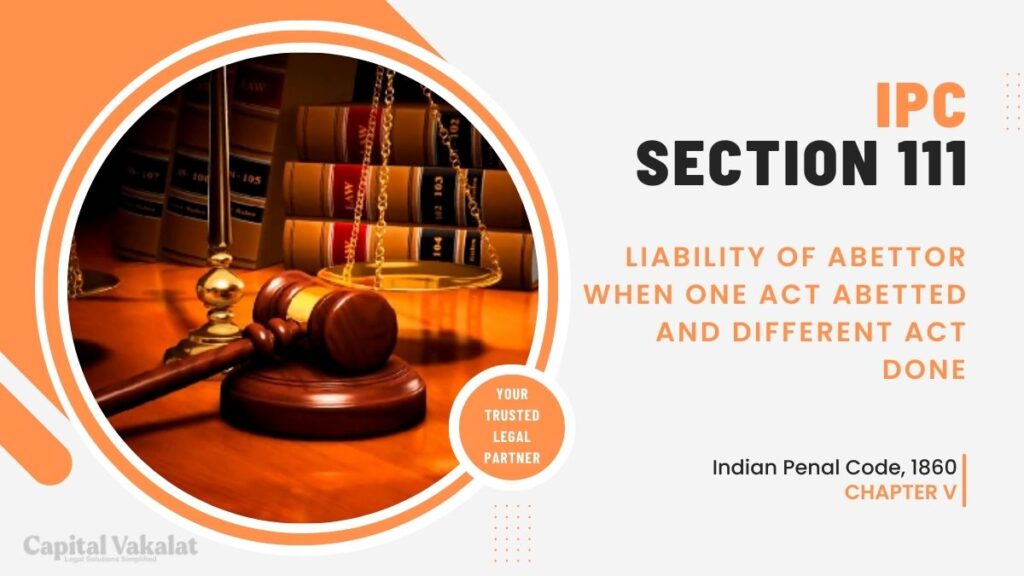Section 111 of the Indian Penal Code (IPC) is a critical legal provision that deals with the liability of an abettor when the act abetted differs from the act committed.

Understanding this section is vital for legal professionals and anyone interested in the Indian criminal justice system.
Understanding Section 111 of the Indian Penal Code
Section 111 IPC specifies that when an abettor engages in the act of abetting, but the act ultimately committed is different from what was abetted, the abettor is liable for the act as if they had abetted the actual act committed. This means that if someone encourages or assists another person in committing a crime, but the actual crime committed differs from the one initially intended, the abettor can still be held criminally responsible.
Key Provisions of Section 111 IPC
This section is essential to establish the criminal liability of the abettor. Some key provisions include:
- The abettor’s intention to abet the act.
- The actual act being committed differently.
- The abettor is liable for the act that is ultimately committed.
Abettor’s Liability in the Case of Multiple Abettors
In cases where multiple individuals are involved in abetting, Section 111 can be complex. The liability may differ based on each abettor’s specific role and intent. It is crucial to establish the degree of involvement of each abettor.
Legal Interpretations of Section 111
Legal experts often analyze the intricacies of this section, particularly when it comes to determining the abettor’s intent and the difference between the abetted act and the act committed. This interpretation plays a pivotal role in court proceedings.
Abettor’s Mens Rea
The mental state or mens rea of the abettor is a critical factor in establishing liability. The prosecution needs to prove that the abettor had the intention or knowledge that the act committed could be different from the one abetted.
Instances and Case Studies
To illustrate the application of Section 111, various instances and case studies can be examined. Real-life cases provide insights into how this section operates in practical legal scenarios.
Importance of Section 111 in the Legal System
Section 111 plays a vital role in ensuring that those who abet criminal acts are held accountable, even if the actual crime committed is not the one they encouraged. This is crucial for maintaining law and order in society.
The Difference Between Section 107 and Section 111 IPC
Section 107 deals with abetment where the abetted act is committed as intended, while Section 111 deals with abetment where the act committed is different. Understanding this difference is essential in legal discourse.
Defenses Available to Abettors
Abettors may have defenses available to them. Exploring these defenses can shed light on how an abettor can protect themselves against criminal liability.
Challenges in Prosecution
Prosecuting cases under Section 111 can be challenging due to the need to establish the abettor’s intention and the difference in acts. The burden of proof is high, and legal hurdles may arise.
Reforms and Amendments
Over time, amendments and reforms have been proposed to clarify and strengthen Section 111. Understanding these changes is crucial for staying updated on Indian criminal law.
Impact on Criminal Justice System
Section 111’s impact on the criminal justice system is substantial. It ensures that those who aid and abet criminal acts are not immune to prosecution, even if the situation takes an unexpected turn.
Conclusion
In conclusion, Section 111 IPC is a critical legal provision that ensures the liability of an abettor when the act abetted differs from the act committed. This section is essential for maintaining the integrity of the Indian criminal justice system.
In this article, we’ve delved into the intricacies of Section 111 IPC, providing a comprehensive overview of its provisions and implications. Understanding the liability of abettors when the abetted act differs from the act committed is essential for legal practitioners and anyone interested in India’s legal framework. If you have more questions or need further information, access the provided link for additional resources.
FAQs
Can an abettor be held liable if the abetted act is not as initially intended?
Yes, an abettor can be held liable under Section 111 IPC if the act they abet is different from what they intended. The law focuses on the abettor’s intent to hold them responsible for the outcome.
How does Section 111 differ from Section 107 of the IPC?
Section 107 deals with abetment when the abetted act is committed as intended, while Section 111 deals with abetment when the act committed is different from what was abetted. It distinguishes liability in cases of varying outcomes.
What are some common defenses available to abettors?
Common defenses for abettors may include lack of intent, lack of knowledge about the differences in the abetted and committed acts, or proving that they withdrew their support before the act took place.
Are there ongoing discussions about amending Section 111 to make it more effective?
Yes, there have been ongoing discussions and proposals for amendments to Section 111 IPC to clarify its provisions and enhance its effectiveness in addressing cases where abetted and committed acts differ. Legal experts and policymakers are considering reforms to modernize this law.